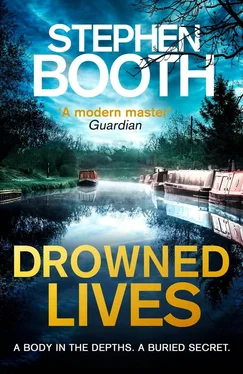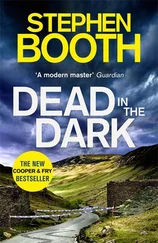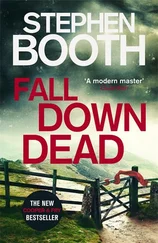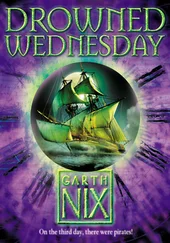‘Mmm.’ Andrew lifted the box, turned it over, stroked his hand against the grain of the wood and stared at the three keyholes. ‘I suppose if you just turn the one key... no, I didn’t think it would.’
‘We tried that,’ I said.
‘We?’ he asked, cocking an eyebrow.
‘A... friend of mine has looked at it too.’
‘No, you’d need all three keys,’ said Andrew. ‘That’s the whole point. That’s why it was made like this.’
‘What do you mean? What is it?’
‘A canal proprietors’ box. It’s the sort of thing they used for keeping valuable items in, like deeds or share certificates, or the company seal.’
‘Would that be valuable?’
‘Of course. The wax seal was what made a document legally binding. Possession of the seal meant financial power. So the seal and its stamp were kept in a box like this, with three locks, which meant three proprietors had to be present to open it. They would each have their own individual key, you see.’
‘It sounds as though they didn’t trust each other very much.’
‘Trust each other? The canal companies were rife with jealousy and rivalry, not to mention the opportunity for dishonesty and misappropriation of funds. You must know the history of some of these companies. The Ogley and Huddlesford had its fair share of disputes and scandals, but it was no worse than many others.’
Andrew hefted the box and shook it gently. ‘No impressor in there, though. In fact, it seems to be empty.’
‘That’s what I thought, too.’
‘An interesting curio,’ said Andrew, handing the box back. ‘If it still had its contents, it would be a real treasure.’
‘And the keys, I suppose.’
‘Well, to have all three keys with it would be a real achievement. Bearing in mind they’d be in the possession of three separate people. This box was deliberately made difficult to open.’
He looked at me as I returned the box carefully to the back seat. ‘Are you going to try to find the other keys, Chris?’
‘How would I do that?’
He laughed. ‘I have no idea.’
I didn’t tell Andrew there was another key in my pocket, and I’d already checked that it fitted the box. I’d decided there were some things I should keep to myself. I could harbour a secret too. I had a good teacher in that art. But, as for a third key, I couldn’t begin to imagine where I would look. I could sense that it might become an obsession, if I let it.
‘I wonder where he got the box?’ I said thoughtfully.
‘Who?’
‘Samuel Longden.’
‘Is that where it came from? Well, well. He was a curious old man in lots of ways.’
‘What do you know about him?’
‘No more than anyone else. But there’s been a lot of talk about him since he died. It seems everyone knew his name on the Birmingham Navigations and the Trent and Mersey, not to mention further afield. Boaters like to gossip when they’re tied up together. You should see them rattling away to each other at a rally. Did you know the boaters called Samuel “The Captain”?’
‘No.’
‘Well, the old Captain was a bit of a character apparently. Eccentric, even. That sort of person always attracts a bit of talk.’
‘Had you met him before?’
‘Not until he started turning up to watch the work parties. They say he’d been off the water for a few years. Couldn’t cope with a boat on his own any more, I suppose, at his age. They call it “having moss on the fender”.’
‘Did you ever come across his daughter?’
‘No. Never met her.’
‘Not many people seem to have.’
Andrew regarded me quizzically. ‘Did Samuel Longden take his project seriously, then? The book business?’
‘It looks as though he did,’ I said.
‘And you? Are you taking it seriously, Chris?’
But I didn’t know the answer to that one.
Back at the house, I placed the box file and the blue folder on the table to look at them properly. It seemed I was going to have to read Samuel’s manuscript for clues about what he wanted me to do.
But this was also the point of no return. Once I opened the folder, I knew I’d be committed. If I wanted to forget all about it, I could still put my coat on, walk out of the door and go down to the pub instead.
Then the phone rang. Saved by the bell, I thought stupidly. But it was Dan Hyde. After the ritual enquiries after my health, he came to the reason he’d phoned.
He rattled on about cash-flow and budget forecasts and credit control, another hold-up that would delay the launch of winningbid.uk.com . It was all stuff I didn’t understand, and I’m sure he knew it. My name was on the loan agreement, though — and on the lease for the offices.
‘So is it something I should be worried about right now?’ I said.
There was a moment’s silence, then Dan said, ‘You’ll need to start worrying about it very soon.’
I put the phone down and took a deep breath. Then I turned back to the bundle of manuscript pages. They lay on the table taunting me, hinting at mysteries and murmuring of a hidden past, just as Samuel Longden himself had done. A curious old man , Andrew Hadfield had called him. That seemed to sum up Samuel pretty well.
But had Samuel’s mind been up to the task of compiling a rational history on any subject, let alone his own ancestors? There was only one way to find out.
The pages of the manuscript were stapled together in chapters. I separated the first chapter of The Three Keys from the rest and carried it through to the sitting room. I settled down in an armchair with Boswell on my lap, and I began to read.
Samuel Longden began his account in the closing years of the eighteenth century, the height of ‘canal mania’. It was a time of speculation, with a surge of wealthy individuals investing in businesses for the potential profit, and inland waterways were a boom industry.
In South Staffordshire, the Ogley and Huddlesford Canal was built principally for the transport of coal, linking local mines to the Coventry Canal at Huddlesford and to the Wyrley and Essington at Ogley Junction. The first proprietors were notable men from the Lichfield area, corporation members or county officials, often connected by mutual business interests, or by marriages between their children.
There were several pages in the manuscript about the leading proprietors, who seemed to me to have been a set of dubious and idiosyncratic characters. Anthony Nall, the first chairman of the canal company, owned a substantial amount of property in Lichfield as well as several coal mines, but his term as chairman was marked by acrimonious disputes with other proprietors and employees. His main ally was his brother Joshua, a merchant who became Deputy Lord Lieutenant of the county and later Chief Magistrate. He had a farm at Leomansley, where he was said to have lived for many years practising his flamboyant signature.
There was James Allwood, a doctor; Edward Wilkinson, an apothecary; Robert Sykes, landlord of the Angel Inn, the venue for corporation banquets and canal company meetings; and Adam Henshall, who despite serving as a magistrate himself was continually being told to remove the detritus of his grocery business — hogsheads and cakes from outside his warehouse in St John Street, and dung and stone from Market Street.
According to Samuel, an important figure was John Frith, a solicitor who’d been steward to successive dukes and was Clerk of the Peace. He had a flourishing law practice in offices near the Market Square. But Frith was elderly and not physically active, so his junior partner Daniel Metcalf took on the role of chief administrator and legal advisor for the canal company. Metcalf was only twenty-six, but was said to be very ambitious.
Читать дальше












